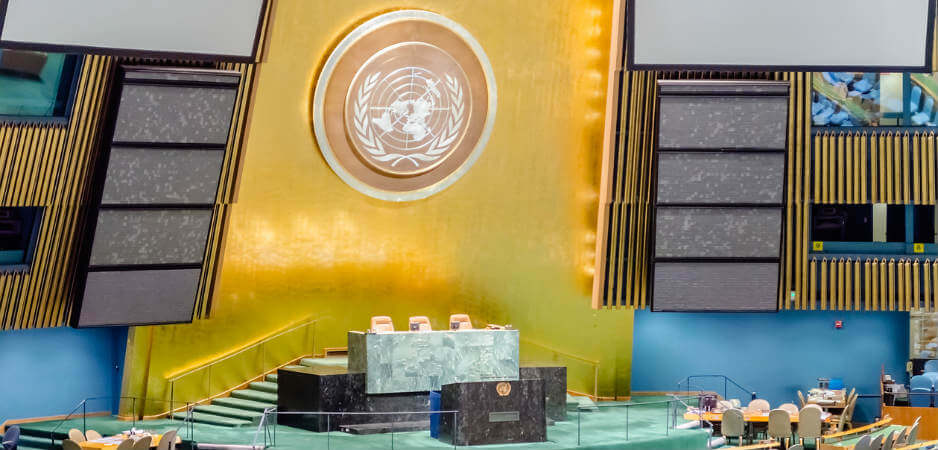By withdrawing from the very institutions it once helped create, America risks losing its global influence.
President Donald Trump recently announced his intention to withdraw the United States from the Paris climate accord, marking the latest step in his gradual campaign to abdicate America’s traditional role as leader of the free world. In April of 2017, Trump withdrew $32.1 million from the United Nation Population Fund (UNPF). More recently, the administration proposed significant budget cuts to the United Nations, as well as to the UN peacekeeping mission, endangering the organization’s effectiveness and ability to function properly. It is now clear that the Trump administration’s America-centric rhetoric and isolationist policies are threatening US interests at home and abroad. But although it appears to be intensifying under his presidency, it is important to note that this trend did not actually start with Trump.
The United States has historically been at the front and center on the world stage, utilizing its powerful position to shape the structure of notable multilateral institutions, such as the UN, the International Atomic Energy Agency and the World Trade Organization. Nevertheless, the de-emphasis of US influence in global affairs started with the invasion of Iraq in 2003 and continued with the lack of US involvement in multilateral initiatives such as the International Criminal Court and the Kyoto Protocol.
Due to the Trump administration’s agenda, the decline in US influence throughout the international community is accelerating at an alarming pace. This is not surprising. Leading up to the election, the Trump campaign policy promoted an “America First” playbook to appeal to isolated voters that we now see become a reality.
Putting aside the alleged factors necessitating the decision to withdraw the United States from the Paris Agreement, President Trump pledged to “ensure that America remains the world leader on environmental issues” and stated that he would be open to renegotiating the deal. Unfortunately for Trump, significant signatories had already dismissed this idea. Remaining the world leader on environmental issues is no longer on the table.
Even though it will likely take years to withdraw from the Paris Agreement, the Trump administration’s intention is symbolic. The cumulative effect of these momentous steps is the forfeiture of US dominance in world affairs. This begs the question: Why should it matter to the United States if it is not the global leader it once was?
First, most of today’s challenges, from cybersecurity to climate change to free trade to religious extremism, are global issues that cannot be tackled alone or are too complex to isolate. An isolationist policy overlooks the interconnectedness of these issues with domestic ones, while an unilateralist policy overestimates the United States’ ability in dealing with such issues. Instead, a multilateral approach is required to not only confront and solve global issues, but also to do so in a manner that serves US interests.
Its position of leadership on the global stage allows the United States to influence international institutions and programs in beneficial ways, shaping policies catered to its own interests and values. For instance, after rejecting the 1997 Kyoto Protocol, the United States ironically played a central role in negotiating the Paris Agreement on more favourable terms. During his time in the Senate, Barack Obama observed about international governance systems that “instead of constraining our power, these institutions magnified it.”
Conversely, any vacuum left by the lack of US involvement will inevitably be filled by another nation that may or may not share the United States’ interests. For example, Chinese investment throughout Africa has been on the rise, and Russia continues to spread its sphere of influence across the Middle East and Eastern Europe as the US retreats. Europe is also stepping up its voice within the international community as it distances itself from the United States.
After President Trump blasted European leaders for not fulfilling their obligations under NATO, German Chancellor Merkel declared that Europe cannot rely on others and should be ready to take matters into its own hands. Further, during a joint press conference with Vladimir Putin, the newly elected French President Emmanuel Macron reprimanded Russian media outlets. He also offered France as a “second homeland” to Americans working on climate change. Based on these incidents, the United States is not only losing influence over international institutions, but it may have to watch as countries with differing interests play a much bigger role in shaping global policy and increase their share in the ever-changing global markets.
Finally, decreasing involvement on the multinational stage by cutting funding to international programs such as the UNPF will not serve US national security interests. The proposed cuts reduce US contribution to UN peacekeeping by about $1 billion, or 50% of what it currently contributes. This is in reality a negligible amount in terms of US military spending, yet it is crucial to the mission. While spending this money on creating peace abroad may seem irresponsible to some critics, the US unfortunately knows all too well how conflicts brewing in distant corners of the world can have dire consequences anywhere. Despite its weaknesses, the UN has been successful in working toward stability in conflict-ridden societies. In doing so, its missions have contributed to security globally and reduced the instances in which the United States may feel the need to intervene — at one-eighth the price tag of what it would cost the United States if it were to act alone.
US leadership is crucial to effectively influence multilateral institutions toward its domestic and global needs while keeping opposing interests at bay. The US government is turning its back on the international institutions and agreements it once lobbied to create. This will not help the United States achieve the greatness President Trump seeks to recapture. Instead, it will reduce its capability to single-handedly deal with the fundamental issues shaping our world.
*[Young Professionals in Foreign Policy is a partner institution of Fair Observer.]
The views expressed in this article are the author’s own and do not necessarily reflect Fair Observer’s editorial policy.
Photo Credit: bwzenith
Support Fair Observer
We rely on your support for our independence, diversity and quality.
For more than 10 years, Fair Observer has been free, fair and independent. No billionaire owns us, no advertisers control us. We are a reader-supported nonprofit. Unlike many other publications, we keep our content free for readers regardless of where they live or whether they can afford to pay. We have no paywalls and no ads.
In the post-truth era of fake news, echo chambers and filter bubbles, we publish a plurality of perspectives from around the world. Anyone can publish with us, but everyone goes through a rigorous editorial process. So, you get fact-checked, well-reasoned content instead of noise.
We publish 2,500+ voices from 90+ countries. We also conduct education and training programs
on subjects ranging from digital media and journalism to writing and critical thinking. This
doesn’t come cheap. Servers, editors, trainers and web developers cost
money.
Please consider supporting us on a regular basis as a recurring donor or a
sustaining member.
Will you support FO’s journalism?
We rely on your support for our independence, diversity and quality.






